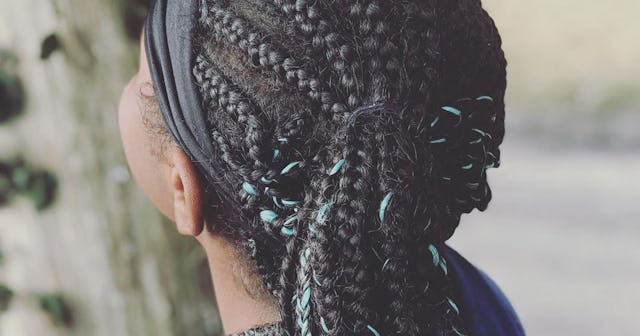Tweens And Teens Are Going To Mess Up--How To Handle It Without Shaming

My tween asks me to do her hair as we’re rushing out the door to school. I pull her braids into a high ponytail, and then turn to throw spoons in my kids’ lunchboxes. Five minutes later, we’re in our minivan headed toward the school. I glance over to see that my daughter’s hair is down. “What happened to the ponytail?” I ask. She glares back at me and says it looked bad.
To me, it’s just a basic ponytail. I don’t understand how it can look bad. I decide not to reply and try to set the tone for a good day. But inwardly, I’m peeved. Our mornings are so frantic, but I took a minute to comply with her request. Couldn’t she just leave it?
Then I remind myself not to take the things my tweens—yes, I have two—say or do personally. Most of the time, their tweenage angst has nothing to do with me and everything to do with the fact that their hormones are rampant — and being a tween, caught between childhood and the teen years, is difficult.
Literally anything I say or do can be a catalyst for one of my tweens to spiral into an emotional abyss. The sound of my breathing, the fact that we’re out of apples, or my child’s favorite missing scrunchie can cause meltdowns that rival that of my toddler’s. Thanks to puberty hormones and lack of maturity, tweens have a challenging time staying emotionally regulated.
Our favorite darling can go from happy-go-lucky to why-can’t-you-get-me-a-cheeseburger-right-now in five-seconds flat. Which leaves us to follow our own advice. Take some deep breaths and think before we speak. Our tweens can grate our nerves faster than a Trump 2020 bumper sticker.
What’s a parent to do when their tween or teen makes mistakes? When a child royally screws up or makes a dumb decision, how should parents respond?
If you’re like me, your go-to is to launch into a lecture. We practice connective parenting—so we don’t rely on grounding as punishment. However, lectures aren’t connective either. When a kiddo is upset, it makes zero sense to step up to our parental pulpit and attempt to reason with them. FYI—they aren’t listening. Until we can get them to a place of calm regulation, they can’t process our words anyway.
Plus, when we respond with our own emotions of frustration, anger, or disappointment, we’re making the situation about us. Unhelpful? You bet. Instead of the child learning a lesson, the kid becomes conditioned to please—or irritate—the parent. We’re focusing on the wrong things.
How can we respond in a way that’s effective and doesn’t shame our already vulnerable and often defensive tweens and teens? What’s been helpful for our family is to ask questions instead of filibuster, hoping that the words will sink in and somehow ensure our child will never make a bad choice again. Asking questions like, “What happened?” followed by, “What do you think went awry?” puts the child in the place to reflect and offer solutions to their own problems.
After we ask our kid to tell us what happened—which prompts them to dish the details—and ask what they think went wrong, we follow that up with another question. What can they do differently next time something similar happens? Again, we’re trying to get our child to problem-solve.
Of course, if they did something harmful to someone else, we expect the child to make amends. This is when we ask, what can we do right now to fix this situation? This might mean an apology and an action. Often, bad choices yield natural consequences anyway. If they chose not to study for their social studies test—instead opting to play video games–they might have received a failing grade. Live and learn, right? There’s no need to reiterate over and over the importance of studying. That big red D on the paper speaks volumes.
As a former college teacher, I encountered so many students in their late-teens and early-twenties who were shockingly incapable of taking responsibility for their actions and problem-solving when they did screw up. They would blame me for the grade they received rather than ask what they could do differently or better next time. They would claim my policies were unfair—as if turning in a paper two weeks late and getting an F was unreasonable. I would be fed excuse upon excuse instead of an honest admission that they procrastinated and then humbly ask for an extra day to get their paper to me.
We all mess up sometimes and need forgiveness and a second chance to do the right thing and in the right way. I want my children to learn this now—not as a 21-year-old college junior. Pausing, reflecting, and thinking through a situation in order to improve is so much better than cowering in shame while the parent rants. That teaches the child absolutely nothing. Asking questions that lead our kids to the right choices is where it’s at.
Yes, tweens and teens can get under our skin—quickly. I have to constantly remind myself that my tweens are in a season of life that feels unpredictable. Though their circumstances aren’t always steadfast, I can be. I can be their safety and their guide rather than their critic. I can also take these years as an opportunity to ask questions that will hopefully teach them do the same when they’re on their own.
I’m holding on tight, because we’re moving toward and into the teen years when I know there will be even more challenges. However, I’m hoping that by prompting my tweens with problem-solving questions now—we’ll continue to have a trusting relationship tomorrow.